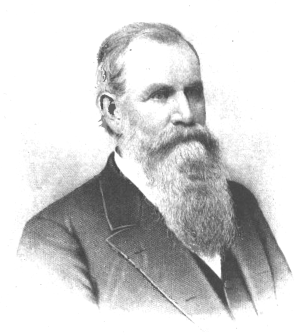John B. Wornall

John Bristow Wornall was born October 12, 1822, in Kentucky. In 1843, Wornall’s family moved to Westport, Missouri and purchased 500 acres of land from John McCoy for a total cost of $2,500.
Wornall was one of the more prosperous farmers in Jackson County. In 1860 he paid “State, County, State Interest and Asylum” tax on $18,500 and received a receipt for $114.85. The 1860 census shows that John Wornall had four slaves and two hired hands (Silas Dawson and Josiah Bassett).
John Wornall was a leading citizen in Jackson County. He was one of the original members and president (in 1856) of The Jackson County Agricultural and Mechanical Association. The association, founded in Independence in 1853, sought to encourage better methods of farming and introduce superior types of crops.
The Wornalls were representative of the southern migration to western Missouri, but they were not the “average” farm family. The average farmer at this time had between 80 and 100 acres of land. John Wornall met with almost unfailing success in western Missouri.
The Wornall house, which faced the main county road leading south toward the Santa Fe Trail, stood in the midst of local fighting during the Civil War. Jayhawkers reportedly occupied it for eight days and it served as a hospital for both sides during the Battle of Westport.
John Wornall was not present during the Battle of Westport, but his wife, Eliza, and nine-year-old son, Frank, remained in the house throughout the battle. Frank C. Wornall, remembered what happened that day.
Father had gone to Westport to escape probable death at the hands of the Federals, for he had been ordered out of the county by Ewing’s Order No. 11. Mother and I were alone all day in the house. We stayed in the cellar while the battle raged around us. Every once in a while a cannon ball would strike in our yard with a thud that shook the house. North of the house was the grove of locust trees that still stands. I could hear the cannon balls cut through those trees with a loud swishing noise, severing limbs and tearing trunks of trees.
When the battle was nearing its close the Confederates took our house for a hospital and the floors were covered with them. While the surgeons worked, mother boiled water to wash the wounds and helped with the bandages. I remember one man who was terribly wounded in the face. Our house was so full he could not come in and he sat on the curb of the cistern and I drew water to wash his wound. Then he got up and walked away. Later in the day the wounded were taken away to Kansas City.